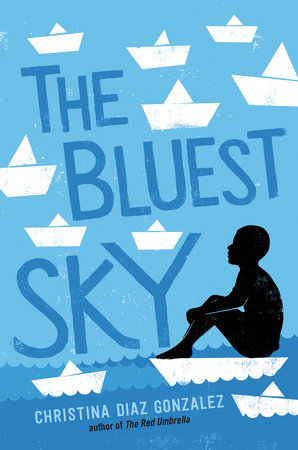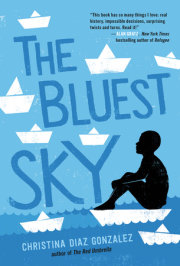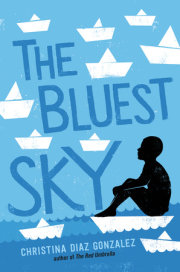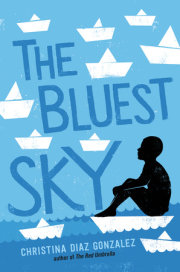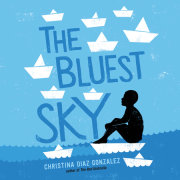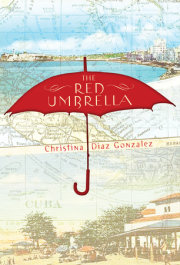1
The palm fronds rustled in the warm tropical breeze as I hunched down to take a sprinter’s stance. My best friends lined up next to me. Our daily race was about to begin.
“Ready?” Teo asked, adjusting his grip on the schoolbooks nestled under his arm.
I nodded and looked over at Isabel, who was poised to take off as soon as I counted to three.
Ahead of us the cracks in the sidewalk fanned out like an intricate spiderweb, providing an extra challenge to our competition. We had to reach the lamppost at the end of the street without stepping on any of the jagged lines that crisscrossed our path.
I untucked my shirt, pushed up my eyeglasses, and waited for a few people to get out of the way.
Maybe this would be the day that I’d finally win, although I wasn’t too optimistic. My wins were usually in math competitions. I’d never been fast like Teo or agile like Isabel, but that didn’t stop me from trying to beat them . . . even if the statistical probability was extremely low.
“¡Uno . . . dos . . . y TRES!” I shouted, hopping over the first crack and sidestepping another. I ran as fast as I could, but was quickly left behind.
“I win!” Isabel announced, prancing around the lamppost with one arm in the air and the other still holding her books. “And I saw you both step on a bunch of the cracks.” Her ponytail bounced around as she taunted us. “I should really try out for the Cuban track team because . . . ¡Soy la campeona!”
“Ooh, you better write down the date,” Teo scoffed. “April 16, 1980 . . . the one day you win. But we all know who the overall champion is.” His smile showed off his chipped front tooth. “Me. Your older and wiser brother. The one who beat you from day one.”
“Here we go,” I muttered.
“Ugh.” Isabel rolled her eyes and held up two fingers. “Dos minutos. You were born two minutes before me and I have to hear about it for the rest of my life. And you are definitely not the wiser one.” She paused to look at me. “Right, Hector?”
I laughed. It was the same back-and-forth almost every day. For twins, the two of them couldn’t be more different. Isabel was short, fair-skinned with dark curly hair, and her personality was like a stick of dynamite . . . explosive at any moment. Teo, on the other hand, was the biggest kid in the entire sixth grade, but he hated fighting or any type of confrontation . . . except with his sister. And he didn’t look much like Isabel either. In fact, some people thought Teo and I were the twins because we were always together and we both had tan skin, wavy brown hair, and similar noses. The only huge difference between us was our size.
“Hector,” Isabel prodded. “Back me up.”
I shook my head. “No me meto.” She wasn’t going to get me involved in their pretend fight. I’d seen this play out several times where it was all a joke until someone took the teasing too far and then it became a real argument.
“Boys, ugh!” Isabel threw her hands up in mock disgust. “Why do I hang out with the two of you?”
“Because you have good taste!” I flashed her my biggest grin. “And we all know who the wisest is. . . .”
“ME!” the three of us shouted at the same time, then doubled over laughing. That settled, we continued our trek home.
As we rounded the corner, Isabel kept on about her victory. She figured that Teo’s bigger size was slowing him down and that she would soon be the overall champ. I was about to suggest creating an equation that might calculate the size-to-velocity ratio when Teo reached his breaking point.
“All right, that’s it.” Teo dropped his books onto the sidewalk in front of a yellow-colored house that had patches of peeling paint. “I’ll race you around the block, right now. First one to come back and tag Hector wins.”
“Nah.” She smiled, knowing she’d finally gotten under his skin. “One win per day is enough for me.”
“Chicken?” Teo challenged.
I leaned against the short white wall that bordered the house’s front yard. There was no way Isabel was going to back down from her brother calling her out.
“¡Vamos!” Isabel spun around and thrust her books into my chest. “Hector, hold my stuff and count us off.”
I gave Teo a slight nod and he understood what I was about to do.
“¡Uno, dos y tres!” I said quickly, not giving Isabel any prep time while Teo took off running.
“¡Tramposos!” Isabel yelled as she chased after her brother, and I laughed at them as they headed down the street. “You’re both cheaters!”
As they disappeared around the corner, I took a deep breath. I could almost catch a hint of salt air in the wind, even though we were miles from the coast. I wished it were already summer so we could ride our bikes down to the beach to go for a swim. Technically, we could go now, but every Cuban knew the water was best in months that didn’t have an r, no matter how nice the weather was.
That meant there were only a few weeks left until my skinny, count-all-my-ribs body would be seen next to Teo’s gargantuan frame.
I glanced over at my shadow on the stretch of white wall. The dark silhouette made me look even longer and skinnier than I already was.
“Kleto,” I mumbled to myself. It was the nickname my older brother, Rodrigo, had taken to calling me lately. It was his own slang, which was supposed to be short for skeleton. I pretended it didn’t bother me, but it did. I wanted to have muscles, even tiny ones, and not just be skin and bones.
The elongated shadow on the wall seemed to taunt me. I narrowed my eyes and stuck out my tongue.
“¿Que tu haces?” a voice called out.
I glanced over at a boy standing in the house’s doorway. He wasn’t very tall, but he was stocky, and as he stepped into the sunlight, I recognized him as one of the older kids from my school. People called him Tincho, and it was rumored that he had failed eighth grade twice because of cheating and fighting. He was someone I knew to steer clear of.
“Me? I’m not doing anything, just waiting for my friends,” I explained, adjusting my eyeglasses.
“I saw you sticking your tongue out at my house. . . . You think you’re better than us or something?” Tincho took a few more steps onto his front porch as a mangy-looking dog snuck out from behind his legs and growled at me.
“No, that was just me goofing around with my shadow.” I sounded like an idiot, but this was not the time to be cool. Besides, his house didn’t look bad. It was like most buildings . . . patched up with whatever people could find.
Tincho squinted as he studied me. “Wait . . . I know you. You’re Rodrigo’s little brother.” He headed toward me. “Which means I know who your father is.”
My pulse quickened. He seemed bigger than when I saw him from far away in school and had a hardened expression, like he was looking for trouble.
“Tu papa es un gusano,” Tincho declared, pushing open the small front gate and walking out into the street.
Gusano. Worm. It was a word charged with meaning. It was an insult reserved for those who opposed the government. And opposing the government, or even expressing anti-revolutionary ideas, could mean losing everything. Your home, friends, job, and even your freedom could all disappear.
“Isn’t that true?” Tincho persisted, getting closer to me. “He’s a traitor, which probably makes you one, too.”
“No, you’ve got it wrong,” I said, backing away and getting ready to run. “You have me confused with someone else.”
I wanted to defend my father, but I had to play it smart. It was something my mother had taught my brother and me from the very beginning. There was what we believed in private and what we said in public. Two versions of who we were.
“Liar.” Tincho poked me in the chest. “I’m not confused.”
“What’s . . . going . . . on?” Teo said, pulling up to the scene a little short of breath, with Isabel only a few feet behind him.
“Nothing,” I said, trying to defuse the situation. I had wanted to run away, but now I didn’t want to seem like a coward in front of my friends. “Everything’s fine.”
“You know this gusano?” Tincho asked as he sized up Teo.
“Who are you calling a gusano?” Isabel pushed her way in between me and Tincho, standing right under Tincho’s nose.
Tincho chuckled. “Tranquila, companera.” He sidestepped Isabel and kept an eye on Teo. “But you should know who you’re hanging out with.”
“I know who he is,” Teo replied, his voice flat. “But you must not.”
“Yeah,” I added, trying to make my presence felt. “We’ve been friends since . . .”
Teo shot me a look that said it all. I needed to shut up.
“Well, do you know that his father is a traitor? My parents told me about him. He’s just like those scumbags hiding out in the Peruvian embassy . . . trash-talking our country and trying to leave Cuba.” Tincho turned to glare at me. “I heard your father was in prison for spreading lies about the revolution, until a few months ago when they kicked him out to go be with the rest of the escoria in the U.S.” Tincho spit at my feet, barely missing my shoes. “That’s what I think of you and your family, gusano.”
I froze for a moment, not sure how to react. My father hadn’t been spreading lies about the revolution, but he had been saying something much worse . . . the truth.
Mama told us he just wanted more freedom. Freedom to voice his opinion, freedom to go where he wanted, freedom to choose what kind of life his family should have. But it was the truth about this lack of freedoms that got him into so much trouble that he did end up in prison.
“No, you don’t understand.” I took a deep breath and tried to push aside the feeling of disgust for what I was about to do. This was simply part of surviving, I told myself. “You’re right that my father is a filthy gusano, but I don’t agree with anything he’s done. I love Cuba. I believe in the revolution . . . in Fidel.” I raised my fist in the air to add more significance. “¡Que viva la revolucion!”
Tincho scoffed. “I don’t believe you. Like father, like son.” He stepped closer, so that I could now smell his rancid breath as he breathed down on me. “Your brother is scum, too.”
“No, i-i-it’s true,” I stammered, inching back until I was up against the short wall. “I’m nothing like my father. He’s--”
“¡Basta! ¡Vete de aqui!” Isabel shoved Tincho as hard as she could, causing him to stumble sideways. She looked defiant standing between the two of us again. “I said GO!”
“Why you little--” Tincho said through clenched teeth.
“Isabel!” Teo scolded his sister.
I pulled Isabel away. Things had gone from bad to worse. I had to fix it.
“Listen, Tincho,” I said in the most soothing voice I could muster. “I’m not--”
I couldn’t even finish my thought.
Tincho had already cocked his arm back and his fist was flying through the air. I swerved backward trying to avoid it, but I wasn’t fast enough. The edge of his balled-up hand caught me on the mouth and the impact dropped me to my knees, my glasses flying off my face.
“¡Idiota!” Teo yelled at Tincho. “Don’t you know who you just hit?”
“A traitor?” Tincho scoffed.
Teo pointed to me on the floor. “He’s Marcela Fulgeira’s grandson. Recognize the name?”
“Huh?” Tincho looked confused.
“She’s the delegate to the National Assembly!”
“¿La Asamblea Nacional?” Tincho repeated, beginning to understand my family connections.
“Hey, Tincho!” A couple of girls from across the street had come outside to see what was happening. “¿Todo bien?”
Teo ignored them and continued directing all his attention at Tincho. “Do you know what kind of trouble his grandmother can bring on you and your family?”
“I . . . um . . .” Tincho shifted his weight from one leg to another.
All I could do was stare at Tincho’s hairy knees, the metallic taste of blood in my mouth. I hated hiding behind my grandmother’s name. It usually offset my father’s legacy and kept our family safe, but suddenly I wasn’t thinking about keeping up appearances anymore. I didn’t care about being seen as a loyal Communist. I wanted revenge.
I wrapped my arms around Tincho’s legs and knocked him to the ground. Before I could land a punch, Teo yanked me up by my collar and pulled me away.
“Enough!” Teo stretched out his arms to prevent anyone from moving as the girls across the street laughed. “Tincho . . . go home. I know you don’t want problems with Delegada Fulgeira . . . Hector’s grandmother . . . right?” He stared at Tincho, who had stood up again.
Tincho glanced over at the girls, then back at me. He slowly nodded, but his eyes were full of hate.
“All right, then, this is over. No one mentions anything about this . . . to anyone.” He stared at me and Tincho. “Now, shake hands and no more talk about anyone being a gusano.”
I wiped my mouth with the back of my hand and saw a smear of blood. My lip was busted. I’d have to come up with a story to explain this to my mom.
“You okay?” Isabel asked, handing me my glasses.
“Yeah,” I muttered as Tincho extended his hand.
I went to shake it when he pulled me closer. He lowered his head so that I could feel his putrid breath blow past my ear. “Watch your back, gusano,” he whispered. “There won’t always be people to protect you.”
A shiver ran down my spine.
Life in Cuba hadn’t been easy before, but I had a feeling it was about to get a whole lot harder. The odds of avoiding Tincho in the future were not in my favor.
2
“Stick to the story,” Isabel warned as we walked down our street on the outskirts of Havana. “If my mother asks, you say that you tripped and fell while we raced. Keep it simple.”
Copyright © 2022 by Christina Diaz Gonzalez. All rights reserved. No part of this excerpt may be reproduced or reprinted without permission in writing from the publisher.

